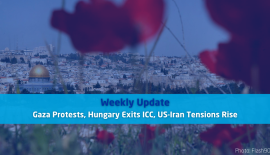Israel & Christians Today: Weekly Update (January 25)
Welcome to our weekly round-up of key events and analysis of current affairs affecting or concerning Israel and the Jewish people.
Jesus said: “Be always on the watch, and pray that you may be able to escape all that is about to happen, and that you may be able to stand before the Son of Man.” (Luke 21:35)
This week, we want to bring five main issues to your attention:
- Irish Parliament considers Bill outlawing settlement products
- War in the Middle East and massive paradigm shift in world economy: EU and Jerusalem are key issues
- Rise in anti-Semitism in Europe
- The status of Jerusalem under international law – not what you think!
- Tehran-Moscow Cooperation goes way beyond Syria
- Irish Parliament considers Bill outlawing settlement products – sparks diplomatic crisis
Times of Israel reports that “the lower house of Ireland’s Parliament advanced a bill on Thursday 23rd January 2019 that would criminalize the import or sale of Israeli goods originating in the West Bank, East Jerusalem and the Golan Heights, sparking a diplomatic crisis with Jerusalem.”
The measure, introduced by the conservative Fianna Fáil – The Republican Party would make illegal “the import and sales of goods, services and natural resources originating in illegal settlements in occupied territories.” Sinn Fein, a left-wing party, supported the bill.
The Dáil, Ireland’s lower house, passed the measure by a vote of 78-45 with three abstentions. The bill must still pass three more stages before becoming law, according to reports.
The proposed legislation declares it an offense “for a person to import or attempt to import settlement goods.”
Likewise, those who “assist another person to import or attempt to import settlement goods” would be committing a crime punishable by up to five years in prison, if the bill were to become law.
“Israel is outraged over the legislation against it in the Dail which is indicative of hypocrisy and anti-Semitism,” the office of Prime Minister Benjamin Netanyahu, who also serves as foreign minister, said in a statement.
The Foreign Ministry reprimanded Ireland’s envoy to Israel on Friday.
- War in the Middle East and massive paradigm shift in world economy are likely: EU and Jerusalem are key issues
Geopoliticaleconomics.org, an independent think-tank, analyses and assesses underestimated geopolitical developments that could impact the real economy and markets. “The post-Cold War World Economy is becoming increasingly shaped by geopolitical forces and trends, so much that – according to Christian Takushi – it is worthwhile to develop concepts, analyses and tools to research this increasingly Geopolitics-driven globalised Economy. Through the dramatic rise of Asian Economies the Global Balance in economic power, politics, military, energy and religion is being affected. Not only has the center of global trade shifted to the Pacific Rim, even the center of christianity has shifted from the West to Asia, Africa and Latin America. Most realms of society are being challenged. Asia leads Emerging Markets as it challenges the supremacy of the West. Having covered the Far East and Emerging Economies for over 25 years, Christian uses his knowledge of Oriental/Latin economies and cultures to analyse how Emerging Nations are affecting global geopolitical and macroeconomic trends (and vice versa), accelerating the overlap of macroeconomic and geopolitical forces. Christian Takushi uses the “intelligence” from specialists in other fields to identify geopolitical factors that could impact the macro outlook of key economies. The Pacific Rim (USA, Mexico, China, Japan, S.Korea, Russia etc) is increasingly driving the global economic and geopolitical competition. In its broader sense, “Geopolitics” encompasses all factors related to the geography & different resources of nation states. From river-grids, impassable mountains, minerals, gas, oil .. to .. labor force, population, their religion and political system. According to Christian Takushi, religion is probably by far the most underestimated geopolitical factor.”
Paradigm Shift & Active Investors’ comeback
Takushi released a report mid-January that “a convergence in the military-security-food-energy complex is intensifying. This implies the growing likelihood of defence realignments, trade routes’ and supply chain disruptions, but also wars and natural disasters among a wider array of large scale occurrences.”
Takushi believes we will soon witness a “paradigm shift in the geopolitical-political landscape. At the core: investors will have to face a massive convergence of geopolitical risks just at a time when central banks won’t be able to provide the extensive shield they have so much endeavoured to provide over two decades.”
Those risks include “growing geopolitical competition between existing and rising powers, military security along the Maritime Routes (without it there is no Energy & Food Security for many economies), the inexorable deterioration of the Middle East and the likelihood of 2-3 large-scale wars in the Middle East-Asia.. … For the first time in decades, the interests of central banks are not extensively aligned with those of large shareholders. … Facing the growing convergence of all the above one central bank after the other is looking outside consensus. Understandably so – academic and market consensus have failed in recent years to foresee major shifts.”
For more information, read the summary here.
War in the Middle East
Takushi also predicts two wars in the Middle East in the foreseeable future, one of them possibly nuclear. The main drivers are the European need for access to Iranian oil, and the focus of the international community on Jerusalem.
In a radio interview in February 2018 Takushi predicted an uprising and humanitarian crisis in the Gaza Strip.
Listen to the interview with Christian Takushi.
- Anti-Semitism in Europe
The European Coalition for Israel (ECI) celebrated its 15th anniversary on Thursday December 6th with a unique symposium in the European Parliament which featured speeches by European and Israeli deputies as well as a first ever Hanukkah candle lighting ceremony inside the European Parliament amidst an enthusiastic conference audience consisting of invited guests from Europe, Israel and the US. The ceremony was led by Israeli Rabbi and MK Yehuda Glick who spoke on behalf of the Israeli Knesset.
While ECI was hosting its symposium, the Ministers of Interior of the 28 EU member states were meeting a few hundred meters away in the EU-Council building to unanimously pass the first ever EU-resolution condemning anti-Semitism in Europe. The declaration calls on EU member states to take steps to ensure security for their Jewish communities, institutions and citizens, to emphasize the importance of Holocaust commemoration and education; calls on all EU member states to endorse the International Holocaust Remembrance Alliance’s working definition of anti-Semitism in the field of law enforcement, education and training; and calls on the European Commission and Europol to pay particular attention to online anti-Semitism and content which advocates the committing anti-Semitic terrorist offenses.
“The decision shows that the work and efforts of ECI over the last 15 years have not been in vain as the EU now takes the threat against Jews in Europe seriously”, ECI Founding Director Tomas Sandell said. “Still we call on the EU to adopt a coherent policy against Jew hatred which also includes threats against the only Jewish state in the world, the State of Israel”, he said.
In his keynote speech ECI Legal Counsel Andrew Tucker further elaborated on this theme by noting that “the Christian nations of Europe were instrumental in giving birth to the State of Israel, as well as the other modern nations of the Middle East”.
“However, over the last 100 years they have gradually distanced themselves from the Jewish State. Since 1973 European policy has focused on pressuring Israel to help create the State of Palestine. Unfortunately, this policy has failed to produce a peaceful resolution to the Israel-Palestine conflict. It is now high time for Europe to reassess this policy. In our view the key to achieving peace in the region is not by condemning Israel and pressuring it to give up land but by strengthening the rule of law. This means acknowledging the sovereignty of the Jewish state, condemning violence and terror, and assisting Israel to protect the rights of all minorities.”
The symposium was co-organised by the European Christian Political Movement (ECPM), the Knesset Christian Allies Caucus and the European Coalition for Israel. Other speakers included EU-Special Coordinator on Combatting anti-Semitism, Katharina von Schnurbein, MEP Bas Belder, MEP Branislav Škripek, MEP Arne Gericke, MEP Heinz Becker, Israeli Deputy-Ambassador to the EU, Walid Abu-Haya, and Knesset Christian Allies Caucus Director Josh Reinstein.
Read the full report here.
New EU Survey reveals: nine out of ten Jews in Europe experience increasing anti-Semitism
According to the European Coalition for Israel’s January 2019 Monthly report:
A new EU-survey, conducted by the EU Agency for Fundamental Rights (FRA) has revealed that nine out of ten Jews in Europe have experienced increasing anti-Semitism over the past five years. The survey makes grim reading. 28 % of those interviewed said that they had experienced harassment because of their Jewish identity, but 79% of them did not report it to the authorities because they did not believe it would be of any help. 38% of the Jews who took part in the survey said that they were considering leaving Europe as they no longer felt safe in their home countries.
The survey, which is the most extensive ever of its kind, confirms an earlier survey released by CNN in November which measured attitudes towards Jews across Europe. The survey found than 1 in 3 of those polled thought that Jews have too much influence. 1 in 5 believed that anti-Semitism is a response to everyday actions of Jews. 40 percent admitted that Jews were at risk of racist violence in their countries.
In his opening remarks Director Michael O’Flaherty of FRA noted that “for many Jewish people in today´s Europe, freedom of belief and freedom from fear remain distant aspirations. More than 70 years after the Holocaust, something like 30% of the Jewish community actively avoids taking part in Jewish events or visiting Jewish sites because they fear for their safety and feel insecure”.
You can read the full report here. For an official response by ECI please read the ECI press release from December 11th2018 here.
ECI has called for a more coherent EU-policy to combat anti-Semitism, which must also include Jews living in Israel, in order to clamp down on the spread of anti-Semitism in Europe. ECI Founding Director Tomas Sandell made his remarks at a press conference in the Jewish Museum in Brussels on Tuesday 22ndJanuary 2019 where EU-Commissioner for Justice, Consumers and Gender Equality, Věra Jourová, presented a new Eurobarometer on the perception of anti-Semitism in Europe which reveals that one in every two Europeans (50%) considers anti-Semitism to be a problem in his or her own country. In an extensive survey released by the EU Fundamental Rights Agency (FRA) on December 10th, 2018, nine out of ten Jews (90%) said that they had experienced rising anti-Semitism in the last five years.
- The status of Jerusalem under international law
A report published in 2018 by The Hague Initiative for International Cooperation concludes that, contrary to the general consensus, “there are strong legal arguments for the position that Jerusalem is part and parcel of the territory of the sovereign State of Israel.” The report continues: “Israel, in our view, has the right that all sovereign states have to choose its capital”.
This report was the subject of a recent seminar organized in the Czech Parliament entitled ”Jerusalem and the future of the Two State Solution”. A report of the conclusions of the Seminar is currently being prepared and will be published shortly.
- Tehran-Moscow Cooperation goes way beyond Syria
According to Emil Avdaliani in a study published this week by the Begin Sadat Centre for Strategic Studies, the Syrian theater exemplifies Russo-Iranian cooperation, but there are other theaters in which Moscow and Tehran have cooperated for years. Their partnership in the South Caucasus and the energy-rich Caspian Sea area are examples of this trend. Taken together, these instances of Russo-Iranian cooperation fit into the pattern of “geopolitical chaos” across Eurasia in which Moscow and Tehran, as well as other regional powers, work together to challenge US dominance.
Andrew Tucker is International Editor of our bi-monthly newspaper Israel & Christians Today. The goal of Israel & Christians Today is to help Christians to take God’s Word seriously, and study current events in the world in the context of the Bible. Click here to subscribe.





